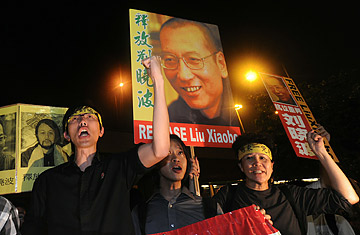
Protestors demonstrate to free Liu Xiaobo, who won the 2010 Nobel Peace Prize, near the China Liason Office in Hong Kong on October 8, 2010. Despite a warning to the Nobel committee and months of behind-the-scenes pressure, China failed to avert a harsh slap in the face — the awarding of the Peace Prize to jailed dissident Liu Xiaobo. Beijing predictably slammed the win for the 54-year-old Liu — the co-author of a bold manifesto calling for political reform who was jailed in December for 11 years for subversion, a sentence that won global condemnation.
Soon after imprisoned Chinese scholar Liu Xiaobo won the Nobel Peace Prize on Oct. 8, a joke made the rounds among Chinese Twitter users able to surmount the Great Firewall that normally blocks the site: "I don't know who this Mr. Liu is," went the gag, "but as a Chinese, I'm very happy for a fellow citizen to win the Nobel Prize. He must be one of our great party members, a great official ... and a great leader who does great deeds for his people."
Liu Xiaobo is, of course, neither a Chinese official nor a Communist Party member. He is a literary critic, a poet and one of China's most principled and persistent dissidents. Since he helped lead the 1989 Tiananmen democracy movement that ended with bloodshed, Liu, now 54, has spent nearly all his time either in jail or under surveillance. Many other Tiananmen-era activists have abandoned their campaigns for all that glitters in the new China or, languishing in exile, have joined splintered, sparring factions. But Liu has kept going, like some relentless human-rights robot. In 2008, he co-authored Charter 08, a pro-democracy manifesto that managed to gather 303 signatures before the authorities intervened, then thousands more online. In the eyes of the Norwegian Nobel Committee, Liu deserves the Peace Prize "for his long and nonviolent struggle for fundamental human rights in China." From the Chinese government's perspective, he is a criminal serving a prison sentence for "inciting subversion of state power."
For the government, indeed, the award of a Nobel to a man who has called the Communist Party an "empty-eyed, all-ignorant dictatorship" must seem a form of torture. The first Chinese-born laureate in literature, who received the award in 2000, was the exiled novelist Gao Xingjian, a French citizen and no fan of the Chinese regime. Several eminent Chinese-born scientists have been awarded prizes, but all of them after leaving the country. And now, someone whom the state brands a criminal has won the Peace Prize—joining the exiled Dalai Lama, the winner in 1989, who is another of the Chinese government's least favorite people.
Still, it's far from clear how many Chinese even know that Liu has won the Nobel. The news wasn't carried on state television. Live feeds of CNN and BBC were cut when Liu's name was announced by the Nobel Committee, and a celebratory party in his honor in Beijing was shut down. Although the state-run Xinhua news service posted a story shortly after his win, quoting the Foreign Ministry's denunciation of the prize, few publications ran it. The front page of the next day's edition of the Communist Party—run People's Daily had nothing on the award. Its sister paper, the Global Times, fulminated that "the Nobel Committee once again displayed its arrogance and prejudice against a country that has made the most remarkable economic and social progress in the past three decades."
Text messages with Liu's name were quickly expunged by censors, and when you input it in major Chinese search engines, the only returns that come up are a few critical domestic stories. Two days after Liu was awarded the Nobel, a student at Tsinghua University in Beijing took an informal poll to find out how widely known the new laureate was. Of 23 students queried, only four acknowledged that they knew who had won the Peace Prize. On Douban, a Chinese website where users discuss films, music and books, one post asking who had heard of "LXB" got some 50 responses. The thread was deleted 16 minutes after it was started. But even in a censored society, word is leaking out. One fruit seller in the southwestern city of Kunming grabbed the hand of a foreigner and asked whether it was true that the Nuobeier, as the prize is known in Mandarin, had been given to a Chinese. "He's in jail," she whispered. "But I think it's very nice that a Chinese received such a big prize."
With his unpolished manner and unfashionable wardrobe, Liu has sometimes seemed like the kind of bumpkin who would be entranced by the modern Chinese dream. He has none of the studied élan encountered in overseas intellectual salons. Enter a boisterous restaurant to meet him and it's easy enough to think the skinny guy loitering in the back is an off-duty waiter, not a distinguished scholar. One of Liu's most scathing essays is "The Philosophy of the Pig," a meditation on how members of the Chinese intelligentsia have sold out, even as far less eminent figures are brave enough to confront the system.
